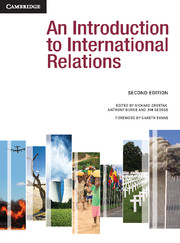Book contents
- Frontmatter
- Contents
- Tables, Figures and Boxes
- Contributors
- Preface and acknowledgements
- An Introduction to International Relations: The origins and changing agendas of a discipline
- 1 Theories of International Relations
- 2 The Traditional Agenda
- 3 The New Agenda
- 21 The United Nations
- 22 Non-State Actors: Multinational Corporations and International Non-Governmental Organisations
- 23 Religion and Secularism
- 24 Global Economic Institutions
- 25 Global Trade
- 26 Global Finance
- 27 Global Poverty, Inequality and Development
- 28 Globalisation and Its Critics
- 29 Global Terrorism
- 30 Post-Conflict State-Building
- 31 Humanitarian Intervention
- 32 Human Rights
- 33 Migration and Refugees
- 34 Global Environmental Politics
- 35 Climate Change
- Glossary of Terms
- Bibliography
- Index
- References
21 - The United Nations
from 3 - The New Agenda
- Frontmatter
- Contents
- Tables, Figures and Boxes
- Contributors
- Preface and acknowledgements
- An Introduction to International Relations: The origins and changing agendas of a discipline
- 1 Theories of International Relations
- 2 The Traditional Agenda
- 3 The New Agenda
- 21 The United Nations
- 22 Non-State Actors: Multinational Corporations and International Non-Governmental Organisations
- 23 Religion and Secularism
- 24 Global Economic Institutions
- 25 Global Trade
- 26 Global Finance
- 27 Global Poverty, Inequality and Development
- 28 Globalisation and Its Critics
- 29 Global Terrorism
- 30 Post-Conflict State-Building
- 31 Humanitarian Intervention
- 32 Human Rights
- 33 Migration and Refugees
- 34 Global Environmental Politics
- 35 Climate Change
- Glossary of Terms
- Bibliography
- Index
- References
Summary
Introduction
The purpose of this chapter is to explain the legal and political features of the United Nations (UN). The chapter begins with a short introduction to the UN Charter in international law, which shows the framework, limits and authorities within which all UN activity takes place. It then puts these into a more practical setting, emphasising how the organisation can be seen as at once an actor, as a forum and as a resource (or some combination of all three).
The UN Charter has near-constitutional status in the inter-state system as it performs two crucial functions that make contemporary inter-state relations fundamentally different from any previous era. First, the Charter defines the essential obligations that governments owe to one another, which include a strict regulation on the use of force to settle disputes, the aspirations to universal human rights and gender equality, and the subordination of states to the collective decisions of the UN Security Council. Second, it creates a set of institutions with formal and specific competencies to oversee those obligations. These institutions, including the Security Council, the General Assembly and the Trusteeship Council, have their own powers, limits and practices, and therefore their own legal and political lives. Since its ratification in 1945, the Charter has been the centrepiece of international law among states, setting the post-1945 era apart from anything that had come before. The organisation has come to include all sovereign states in the world, or at least all states that are widely recognised as being states (where who counts as a ‘state’ is largely endogenous, that is: it is defined by who the UN will accept as a member), and so its rules and powers have come to make up the constitutional structure for inter-state relations.
- Type
- Chapter
- Information
- An Introduction to International Relations , pp. 296 - 309Publisher: Cambridge University PressPrint publication year: 2011



